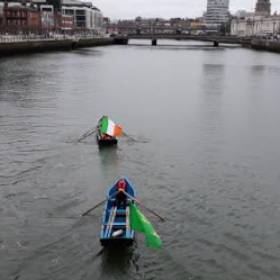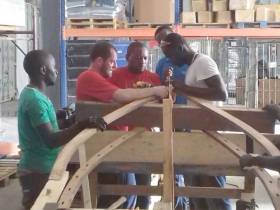Displaying items by tag: Currachs
Meitheal Mara's Traditional Currachs Make Welcome Return in Ocean to City Youth Event
The river Lee was bustling with young people in traditional currachs as Meitheal Mara hosted their first physical event in Cork Harbour almost two years.
Some 50 participants in over 20 boats took part in the Ocean to City Youth Event, covering the 4.5km from Blackrock Village to Lapp’s Quay.
The Ocean to City Youth Event is part of the main Ocean to City –An Rás Mór since the very first race in 2005. Due to restrictions this year, it was held as a standalone event.
This year’s race participants reflect the great diversity of Meitheal Mara’s Bádóireacht youth rowing and sailing programme. Crews included young people from Mayfield Neighbourhood Youth Programme, Foroige’s Big Brother Big Sister programme, CDYS Youth Work Ireland Gurranabraher, St. Joseph’s Foroige Mayfield, Educate Together class of 2019, Naomhóga Chorcaí Currach Club, Fionnbarra Youth Crew, Glanmire Foroige, Foroige Togher and members the Bádóireacht Youth Council including past pupils from Cork Life Centre.
Some young people have been rowing with Bádóireacht since as far back as 2017, however, many there today were only introduced to currach rowing for the first time two months ago.
Over the past twenty years, Bádóireacht has provided rowing and sailing programmes to thousands of young people that would not otherwise have had access to the water. Bádóireacht in particular works with young people from marginalised groups or communities that are vulnerable or at risk of isolation. Over the past two years in particular; as a provider of non-contact, outdoor sport; Bádóireacht has played a particularly important role in creating a space where young people can be active and sociable in a safe environment. Today’s Ocean to City Youth Event is a culmination of that work.
The event is a celebration of the resilience of the young people over the past 18 months, of their achievements in training for this race and to mark the return of many more events and celebrations on the water.
Ocean to City participant Liam McCormack said: ‘’We trained for the last three months with the Bádóireacht programme as well as with Naomhóga Chorcaí. It has been great craic getting out on the water every week – I probably would have gone mental without!’’
Over the past year, Bádóireacht has also worked with Togher and Glanmire Foroige groups to establish integration rowing programmes with young people living in Direct Provision accommodation. This work has resulted in two very successful rowing programmes taking place this summer. These programmes are building on Bádóireacht’s work with young people from migrant communities since 2017 and sees young people from Direct Provision centres taking part in Ocean to City for their third successive race.
Clare Hayden, Bádóireacht Manager, said: ‘’I’m thrilled to have delivered a physical event for our young people at last. They have shown fantastic resilience over the past year and we’re delighted to put on an event to celebrate them. Our rowing programme gives young people space away from what’s going on in their lives. It gives them skills that they can build on and grow in confidence. They learn to problem-solve, overcome challenges in difficult weather - and it is fantastic to see them come through that programme and complete the 4.5 km race.’’
The Bádoireacht programme and youth event are organised by Meitheal Mara, the community boatyard, training centre and charity located in the heart of Cork City.
Currachs Mark Centenary Celebrations of Dail
#Rowing: Two currachs set off from Ringsend and rowed up the Liffey into Dublin city to commemorate the 100th anniversary of the First Dail on Monday. Paraic Ó Fatharta, Gearoid Ó Conghaile, Dave Kelly and piper John Lamb drew the attention of an unsuspecting city audience to the Liffey. At 3.30 they positioned the currachs between the Ha'penny Bridge and O'Connell Bridge, while Lamb piped Amhrán na bhFiann to coincide with the centenary commemoration under way at the Mansion House at the same time. The Tricolour and the Starry Plough were flown.
Could Currachs Made in Cork Harbour be the Solution for the Devastated Fishing Community in Haiti?
This month a collaboration between Haiti Orphanage Project ESPWA, Cork’s Community Boatyard, Meitheal Mara, and Naomhóga Chorcaí saw two flat pack currachs making their way to Haiti. The mainstay of the Haitian economy was agriculture and fishing which were wiped out after the 2010 earthquake. To hasten a meaningful recovery these industries need to be revitalised.
Cork volunteers, Seamus O’Brien (Meitheal Mara) and John Cronin (Haiti Orphanage Project ESPWA founder), travelled to Haiti to teach the locals to build currachs - the traditional Irish fishing boats.
Seamus O’Brien told us “this could be an affordable and easy solution to replacing the fishing boats that were destroyed. We now know that 80% of the materials can be sourced locally which makes this project very feasible.”
The two currachs were assembled in just three days. Seamus mentioned “the local workforce were really enthusiastic and picked up the skills very quickly. They even built a wood steamer while I was there which we can replicate in our boatyard so we both learned from each other.”
The boats were launched this week in Haiti and will be tested over the coming weeks in local waters. Seamus told us that “this is a very positive step, and with some small adjustments this can be a really viable project which will change lives.”
Seven years on Haiti is still struggling to rebuild after the 2010 earthquake, countless lives were lost and the death toll was ever increasing with the rampant spread of cholera. Rebuilding has seen many setbacks with two hurricanes hitting the island and a three-year drought bringing more poverty and political unrest.
The Haitians are a very resilient people, who strive to be self-sufficient again. With the help of various charities they are slowly achieving this, but with so many people still living in camps and many more below the poverty line it will be a long road.
Currachs Race & Yachts Parade into Dublin for River Liffey Spectacle This Weekend
This weekend the River Liffey and surrounding areas come to life in celebration of Dublin’s rich maritime heritage and local boating communities, past and present, with a mix of free open air spectacles and events for the public to enjoy both on the water and on land.
On Friday evening, 18th September, the Dublin Docklands Office and Oireachtas na Gaeilge will stage a Currach racing event on the River Liffey. At 5.30pm on Culture Night, currachs will set off from the pontoon by the Jeanie Johnston Tall Ship and race for 2km up river to the Ha’penny Bridge and back.
On land, a series of talks and films about currachs and the beautiful Galway Hookers will take place in the Dublin Docklands Office on Custom House Quay, while the Dublin Dockers’ Preservation Society will also host an exhibition of photographs chronicling the history and the people of the Docklands.
On Saturday, 19th September, Dublin City Council in conjunction with Dublin Port Company will open three bridges consecutively - the Samuel Beckett, Sean O’Casey and East Link bridges - over the River Liffey to allow the passage of yachts from Dublin Bay to the Custom House Quay area of the city.
The Parade of Sail & River Liffey Cruise event will feature as many as 30 sail boats which will congregate at the East Link Bridge at 3pm on Saturday 19th September 2015. Between 2.30pm and 3.00pm both the Samuel Beckett and Sean O'Casey Bridges will open, followed by the East Link Bridge.
The boats will make their way down the River Liffey through the three bridges and will turn at the Matt Talbot (Custom House) bridge and come back up the river where they will then dock at the pontoons outside the 3 Arena.
A spokesperson for Dublin City Council said: "The Dublin City Council Docklands Office were delighted to be associated with these events which is in keeping with their policy of animating the River Liffey and facilitating its use as a natural resource for the public."
Eamonn O’Reilly, Chief Executive, Dublin Port Company, said: “Dublin Port Company is committed to integrating Dublin Port with the city through a wide range of events and initiatives that celebrate the maritime heritage and traditions of Dublin as a port city. We are delighted to be involved with the Currach racing and Parade of Sail, and I would encourage everyone to come along and show their support for the boating community on the River Liffey this weekend.”
Meitheal Mara’s ‘Boatyard Open Day’
Topics will be on classic and traditional boat repair, restoration and build boatbuilding and lofting to varnish and tarring. The exhibition will feature slideshows and a boat display of a folk boat, Crosshaven clinker rowing punt, thullier sailing clinker punt, Valentia carvel seine boat follower, Rinn Rua, pram dinghies, currachs and canoes.
Also on hand will be Siubhán McCarthy who will be talking about the 'Ocean to City' race and what's happening in Cork harbour. For information contact Meitheal Mara Tel: (021) 4316813 or [email protected]
































































